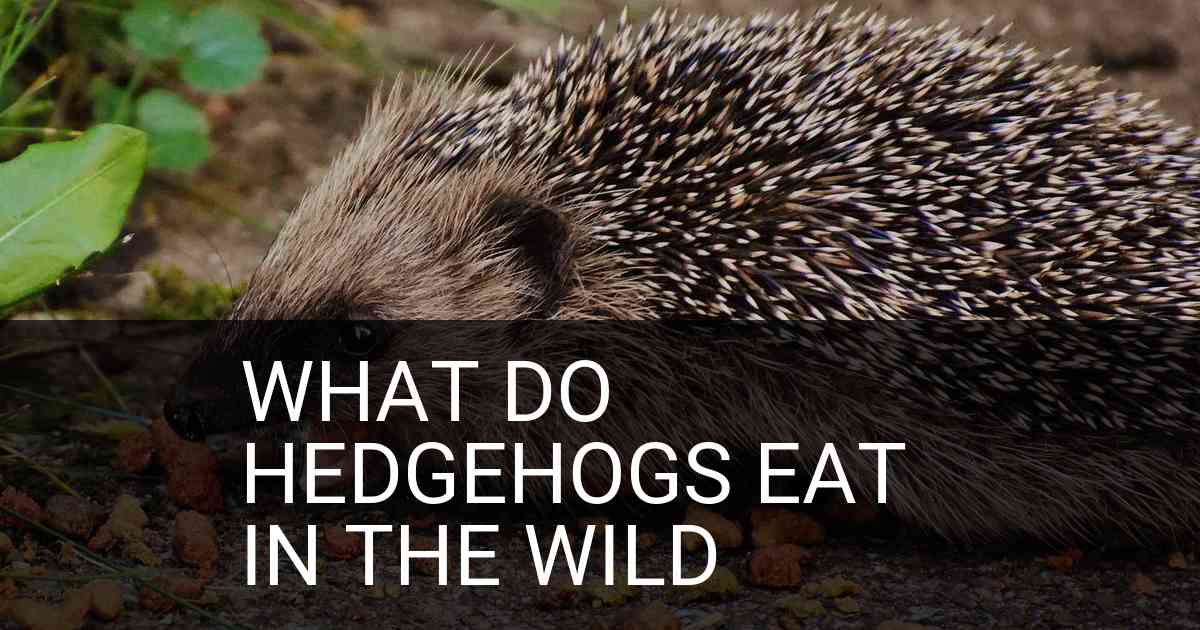
Hedgehogs are beloved animals that have been kept as pets for centuries. In the wild, hedgehogs must fend for themselves when it comes to their meals. But what do they eat? In this article, we will explore the diet of hedgehogs in the wild and discuss what foods they prefer and how best to provide them with a healthy meal. We’ll also look at some of the risks associated with improper nutrition for these small mammals. So if you’re curious about what to feed your pet hedgehog or just want to learn more about these fascinating creatures, read on!
What Do Hedgehogs Eat In The Wild?
In the wild, hedgehogs are omnivorous and will eat a variety of foods. Their diet consists mostly of insects such as beetles, caterpillars, snails, slugs and worms. They also feed on small rodents, amphibians, fruits and vegetables. Hedgehogs have even been known to consume bird eggs or nestlings.
In addition to these prey items, hedgehogs may also scavenge for food in the form of carrion or fallen fruit from trees. This behavior helps them stay healthy by providing a source of fatty acids and other essential nutrients not found in their regular diet.
Foods To Feed Your Pet Hedgehog
If you’re keeping a pet hedgehog at home it is important to provide them with a balanced diet that mimics what they would eat in the wild. Appropriate foods include:
- High-quality commercial dry cat food specifically made for hedgehogs
- Fruits and vegetables (such as apples, pears, bananas, melon pieces)
- Cooked meats (chicken breast or boiled hamburger)
- Live insects (mealworms or crickets)
- Hard-boiled eggs
Types of Food Preferred by Hedgehogs
Hedgehogs are omnivores, meaning they eat both plant and animal-based foods. They should be fed a varied diet that includes high-quality cat or dog food, insects, fruits, vegetables, and fungi.
Cat/Dog Food
High quality commercial hedgehog food is usually made from ingredients such as poultry meal, fish meal, corn gluten meal, wheat flour, beet pulp, vitamins and minerals. It should contain at least 30% protein and 15% fat.
Insects
Insects provide an important source of protein for hedgehog diets. Commonly offered insects include crickets, waxworms (in moderation), earthworms and mealworms.
Fruits & Vegetables
- Apples
- Bananas
- Carrots
- Grapes
- Kale
- Mango
The Benefits of Feeding Wild Hedgehogs
Hedgehogs are an important part of the natural environment and can be beneficial to gardens and landscapes. They help to control pests, disperse seeds, and generally improve biodiversity. As such, providing them with food is a great way to encourage their presence.
Nutritional Benefits
Feeding wild hedgehogs can provide them with much-needed nutrition that they may not get from their natural diet. In addition to insects, small mammals, eggs, fruits, and vegetables found in the wild, hedgehog feeders often include specially formulated animal foods like dry cat or dog kibble as well as mealworms.
Encouraging Hedghog Populations
By providing additional sources of food for hedgehogs it can help support local populations by reducing competition for resources. This could lead to more breeding pairs in an area which would help keep healthy numbers of hedgehog population around gardens and woodlands.
Attracting Hedgehog Visitors
Providing a reliable source of food encourages hedgehog visitors both day and night. Placing out a bowl or dish of food will bring many curious visitors who will also eat other things in your garden while they’re there.
- Safe Food Sources: Avoid feeding human foods like bread or milk as these can cause digestive issues for the animals. Stick with specially designed hedgehog foods or those listed above for safe consumption.
- Hygiene: Remember to clean up any leftovers every morning before you refill the feeder so that uneaten food does not attract unwanted guests like rats.
- Location Matters: Place the feeders away from roadsides where they could be hit by passing cars but close enough so that wildlife can reach them easily at night time.
- Keep It Natural: Try not to disturb or interfere too much when observing wild animals in their natural habitat; enjoy watching from afar while keeping noise levels low!
A List of Foods Suitable for Wild Hedgehogs to Eat
Wild hedgehogs have a varied diet, ranging from insects and worms to fruits and vegetables. In the wild, they typically feed on whatever is available in their immediate environment. Here is a list of some commonly eaten foods by wild hedgehogs:
- Insects: Crickets, mealworms, wax-worms, slugs, snails, beetles and caterpillars.
- Worms: Earthworms or night crawlers.
- Fruits & Vegetables: Apples (without seeds), cranberries, strawberries, blueberries, grapes (without seeds), melons (with the rind removed), carrots (shredded or boiled) as well as other leafy greens such as dandelion leaves and clover.
(Note that while it is possible for hedgehogs to eat many types of food available in pet stores designed specifically for them; these are often not nutritionally balanced so should only be used occasionally)
Foods Not Recommended For Wild Hedgehog Consumption
- Meat & Fish: Raw meat or fish should never be fed to wild hedgehogs because of the risk of bacterial contamination.
- Avocado: Avocados contain a toxin which can cause digestive upset in hedgehogs.
- Citrus Fruits: Citrus fruits, including oranges, lemons, limes, grapefruit etc. may irritate the stomach if consumed by wild hedgehogs.
- Nuts & Seeds: These are too high fat content for wild hedgehogs and could lead to obesity if consumed regularly.
Conclusion
In conclusion, hedgehogs are omnivorous animals that feed on a variety of items in the wild. They mainly consume insects, slugs, and worms but also eat fruits, berries, mushrooms, and even small reptiles or amphibians if available. It is important to supplement their diet with appropriate foods from pet stores to ensure they get all the necessary nutrients for good health. A balanced diet of both natural food sources and commercial products can help maintain your pet’s wellbeing for years to come.

